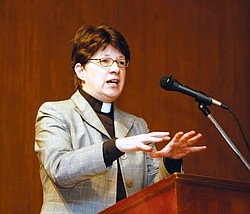Bishop explores faith in politics
Bishop Elizabeth Eaton explored the role of people of faith in America’s political process. at a prayer breakfast at Maronite center in Austintown Tuesday Morning
People of faith are charged with being advocates for the invisible in society.
YOUNGSTOWN — With wit, insight and a challenge to her audience, Bishop Elizabeth Eaton explored the role of people of faith in America’s political process.
She was keynote speaker at the Mahoning Valley Association of Churches’ 23rd annual Mayors’ Prayer Breakfast on Tuesday morning at the Maronite Center. Some 230 representatives of the religious community in the Mahoning Valley attended.
The leader of the Northeast Ohio Synod of the Evangelical Lutheran Church of America said people were probably feeling a little lost now that the election is decided. But, she noted, drawing a laugh, it probably won’t be long before the primaries start again, referring to the length of the last campaign.
Getting down to her topic, Bishop Eaton said, “The foundation of the country is based on religious freedom.” She quoted the First Amendment to the U.S. Constitution — “Congress shall make no law respecting an establishment of religion, or prohibiting the free exercise thereof ....”
She noted separation of church and state means that the government can’t dictate people’s religious beliefs.
“Religion and politics go hand in hand ... this isn’t a new phenomenon,” she said, noting that the very law that guarantees freedoms of the press, religion and speech entwines religion and politics. “No other country has as many religions as this country does.”
Prayers from three religious traditions were offered at the breakfast. Presenters were Brother Walid Abuasi, imam at the Islamic Society of Youngstown; Ellen Satre of the First Unitarian Universalist Church and the Rev. Cosmin Antonecu, pastor of Holy Trinity Romanian Orthodox Church.
Bishop Eaton mentioned various denominations that established themselves in different parts of America. Members of the denominations were involved in communities all over the country. Americans sought “life, liberty, and the pursuit of happiness” as they settled the country and spread religions. Bishop Eaton likened that to the “abundant life” mentioned in Scripture.
Bishop Eaton said freedom allows people of faith to be involved in the political process. She described their role as “active advocacy.”
She listed “the poor, the widowed, the orphaned, the marginalized, the stranger” as those who must be helped. “We’re set free to act for the poor .... because our salvation has been taken care of,” she said. The tenets of many religions mention acts of charity as integral to the faith.
Elsie Dursi, MVAC director, recognized the work of the CROP Walk Committee. Area projects were held during October in Youngstown and Warren, and proceeds fight hunger globally and locally through Catholic Charities, Fish Samaritan House and Protestant Family Service.
Bishop Eaton said advocacy is an act of faith. She said those elected to government offices should lead the way. “Political service is a noble calling,” she said, because of that role.
She said elected officials and people of faith must “see those who are invisible to the rest of society.” But she said, if public officials don’t embrace this task, people of faith “must be active and get the attention of public officials.”
Tom Sauline, a consultant in the office of religious education in the Catholic Diocese of Youngstown, introduced the bishop as a person with an “ecumenical spirit” and a “good sport,” referring to her role as a basketball referee. He mentioned her list of accomplishments including her work with the Lutheran-Catholic Covenant Commission.
Bishop Eaton prompted a laugh when she said the introduction made her sound like a combination of the Waltons and Mother Teresa. The bishop, who has a master of divinity degree from Harvard Divinity School, served as an interim pastor at Good Hope Lutheran Church in Youngstown. In 1991, Bishop Eaton became pastor at Messiah Lutheran Church in Ashtabula, where she was at the time of her election. She oversees 316 pastors and 205 congregations with 84,236 members. The bishop’s term is six years.
 43
43

